Features
Is Catastrophic Collapse Imminent?
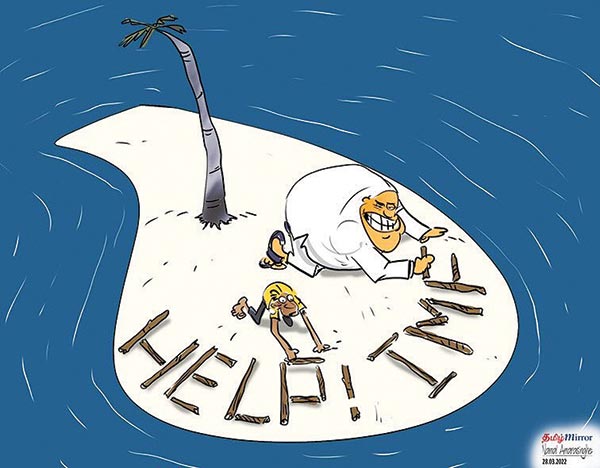
by Kumar David
An optimist would venture to say that an economic catastrophe is not imminent, using the adjective imminent literally. He would be emboldened to make this remark because a restructuring deal, maybe a tough one, seems likely to come out of the negotiations with the IMF. Since all other lenders take their cue from the IMF thanks to its expertise and experience, Sri Lanka is likely to clinch agreements of different forms with China, India and Japan; life will go on. The country seems important enough for international actors such as India, China, America, Britain, Japan and the QUAD to be concerned about; in the case of India strategic concern is natural. America threatened war if Cuba stationed Soviet nuclear missiles, and now Russia is apoplectic at the thought of NATO getting its fingers around its neck via Ukraine, Finland and Sweden. No great or regional power will allow foreign bases near its land borders or its littoral waters. India’s anxiety is no surprise but such concerns should not be a passage to America and Europe. Actually, Lanka has little relevance to the Quad strategy of encircling China and is irrelevant to NATO’s scheme to suffocate Russia. The so-called Indian Ocean strategic zone too is a myth.
Therefore, my view is that the ongoing flurry is not primarily strategic or about world-power relations; the spurt of foreign interest is political and psychological. The psychological facet is that though we know we are a bunch of s.o.bs, foreigners, poor suckers, have affection for this island, and believe it or not its undeserving people. Let’s not spoil this advantage; let’s keep the charm of genuine non-alignment alive. Competition for mating-rights gets us, petrol, cooking-gas, milk-powder, pharmaceuticals and dhal. It would have been helpful if we had slaughtered fewer Tamils and now refrain from harassing Muslims on trumped-up charges. Lanka is no dream democracy; it is the site of militant and state-terrorism and crass military-police human rights abuse at the instigation of the JR, Premadasa Snr. and Mahinda regimes. It has been a locale of brazen plunder by political leaders, and not only in the (Raja)Paksa era. Racism is widespread among the people, but then ethnic intolerance is a global pandemic.
This is all true but there is another crucial aspect. Lanka is one of few post-colonial outposts where constitutional governance, admittedly imperfect, survives. Our giant neighbour India is another. This is different from Burma, Pakistan, Cambodia, Thailand (never colonised) and 50+ countries across Africa, Central Asia and Latin America. Hence my thesis is: India and the West, though they will be tough on economic reforms (IMF, West) and political changes (India), will not allow Lanka to collapse into anarchy and chaos. The uncles and aunties crowding over our crib will throw a lifeline before we asphyxiate. Can you imagine India, the West or China standing by and doing nothing if Lanka sinks into bedlam? We do not deserve a reprieve, but international political and psychological concerns will play out to our profit to prevent catastrophic meltdown. This is my hypothesis; let’s see if events prove the hunch correct.
However, this hypothesis does not allow conclusions to be drawn about politics or the traumatic fuel crisis of this (late June) moment; fuel is the litmus test that will decide whether RW’s administration survives. So far it has been paralysed and it has failed to inspire confidence that it has a way out. It must stop deceiving the public about the state of the fuel supply-chain. It will have to find an immediate fuel fix if mounting violence outside petrol stations is to be contained. This is the moment’s do-or-die challenge.
Of course, our congenital problems will persist but sudden death will likely be averted for now, that this till the IMF negotiations are finalised and implemented. Three IMF teams visited the country, one examining fiscal balance and seeking to restore a measure of equality between government expenditure and revenue and a second looking broadly at public finances (money supply, debt, banking, financial stability, social welfare). The third team worked on debt restructuring and interacted with legal advisors cum consultants hired by the government, Lazard and Clifford Chance. Chance is a London based law firm; Lazard engages in asset management, financial services and is also an investment bank with offices in New York, Paris and London. Judged by conventional norms, we have a strong squad on our side.
The wisest stance for Parliament and the opposition (SJB, TNA and JVP-NPF) to adopt at this juncture is to allow these negotiations to proceed and do nothing to disrupt them. Walking out of parliament when critical negotiations about the country’s financial destiny are in full-swing and the 21st Amendment (maybe renamed 22?) is about to be tabled, is both imprudent and irresponsible. The protocols imposed by the IMF could, at worst, be a repletion of its old Structural Adjustment designs: laissez-faire (nearly unchecked free-markets as in JR, Premadasa Snr times), pro-business, privatisation and foreign capital oriented, inimical to state participation in the economy, hostile to state spending on welfare (health and education) and pushing for labour-market reform (easier firing, lowering real wages). To be fair however we have to wait and see, and some changes to Lanka’s economic structures are in any case justified. RW’s natural inclinations would be to go along with right-wing, market-oriented proposals.
21A (22A?) now finalised and about to be tabled in Parliament is defective; too much power retained by the president despite substantial pruning. Instead of debating and discussing these two urgent matters in the House and from there taking them to the public arena, for the Opposition to walk out of Parliament is an unbelievable act of stupidity. I am surprised Anura, Vijitha Herath and Harini fell for this senseless stunt. They must return forthwith and address the tasks that await them; that is, critically examining the protocols agreed with the IMF and proposing amendments to 21 (22) A.
The RW government should be given the space to work through this emergency (EX) period when the country is in intensive care (say a month or two), but this is not what RW seems to have in his mind. He speaks of remaining in office for much longer: “Once we have established a firm economic foundation you (the people) can hand over power to any political party you wish”. This could be one year, or maybe he has it in mind to hang on till the November 2024 (Presidential) and August 2025 (Parliamentary) elections. RW would then be governing without a mandate from the people (reasonable during an existential crisis such as now) for an extended period; this is unreasonable.
Another matter is that the emergency medications that Lanka will be forced to swallow, whether it likes it or not, to secure urgent foreign debt restructuring via IMF and space from foreign creditors, will not be much different whether Ranil Wickremesinghe or Vladimir Lenin is PM. We are in such a mess that we have to grab any rope that is thrown to us. That’s why I say, allow Ranil to steer during the emergency (EX) period – which madman wants to shoot the pilot in mid-air halfway through a flight?
RW has his known proclivities and policy preferences and some will dovetail with anticipated IMF protocols. We can criticise but may have no option but to accept some. But allowing RW to set the economic direction of the country in next medium-term (MT) say three-year period is another matter; his remit has no electoral mandate. He has a right to his preferences and proclivities but no right to impose them on the country without a mandate. I make a crucial distinction between the period of negotiations with the IMF (the emergency EX phase) and a three to five-year MT economic, financial and social programme that requires a mandate. This is the distinction between trauma-therapy urgently administered during EX and longer-term recuperation strategies to rebuild economy and society.
Will a government elected in say one year be any better? Will there be a smaller number of donkeys and crooks? Have people learnt their lesson? There is a convicted felon seated in Cabinet right now – Mr President and Mr Prime Minister please explain. A multi-billion-rupee tax-dodger has been made a Minister. The voters of Ratnapura returned a convicted murderer to parliament. But this is what we call democracy – the right of the people to choose which bunch of vampires will suck their blood next time. Unfortunately, there is no acceptable alternative to democracy; a one-party state will not survive without open revolt because of our post-Donoughmore past and also because our national ethos and psychology will not accept it. The other option, a military regime will be hell on earth, so no more mention of that.
Why has the Lankan economy collapsed? Depending on how far back you go and your preferred ideology the answers are many, and all true. The following are the most frequently adduced.
* National consumption far exceeded production for seventy years and we ate our way into debt.
* Excess consumption was financed in part by foreign borrowing which plunged the country into the black-hole of ‘dollar indebtedness’.
* Export earnings fell far short of import expenditure (chronic balance-of-payments deficit).
* Government finances were out of kilter, with revenue falling way short of expenditure and the indebtedness was paid for by reckless rupee printing (chronic fiscal-deficit).
* Stupid projects by Rajapaksa regimes (Mattala Airport, Hambantota Harbour, Lotus Tower, Hambantota Stadium, show pieces named after Mahinda Rajapaksa) bankrupted the country.
* These projects were financially wasteful and executed either as prestige ventures or to collect commissions from contractors. These are part of staggering corruption activities amounting to billions of dollars perpetrated by the Rajapaksa Clan, re-elected with a massive majority!
* Breakdown of the rule of law and judicial independence.
No country can withstand such an inferno of epidemics, pestilences and plagues. It is all of this that has come together in 2022 to sink the ship. If it survives for the few EX-months, then the next step is elections to empower a government for MT. My preference is social-democracy with a well thought out dirigisme (state directed) component in its economic policy package. If it is necessary to wait till next time round for the electorate to mature and elect this option, let’s wait till vox populi comes around. Most likely a centrist or centre-right alliance will be elected in an election right now (options, Sajith, Ranil-Sajith, Dulles-led SLPP). Their right or centre-right policy spaces will be defined by terms like, market-oriented, business-friendly, private-sector led development, privatisation, restructured labour-market, FDI oriented, and rather harsh on the grassroots regarding welfare and subsidies.
A social-democratic alternative will have to borrow some of this but the difference will be in implementation and orientation. Eran Wickramaratne in “A Just Tax System” Daily Mirror 27 June writes in a vein where social-democrats seeking to direct the economy (dirigisme) into just directions cannot ask for more (Was he ever a Party Member!). In recent decades, lines have blurred everywhere between avant-garde liberalism and 21st-Century social-democracy.
This brings me to a last thought. The LSSP’s Tissa is sharp and intelligent; what on earth is he doing with that spent force Vasu and two jackals Wimal and Udaya? Isn’t it as clear as daylight that the LSSP must move over and align itself with the new left (JVP, FSP etc)? Yes, yes there’s 1971 and 1989 and the five-lessons, and etc and etc. Who doesn’t know all this? I wrote the first left critique of the JVP (Ajith Samaranayake did a brilliant translation) which the Party published 50 years ago. But it’s not that same world any longer Comrade!
Features
Ukraine crisis continuing to highlight worsening ‘Global Disorder’
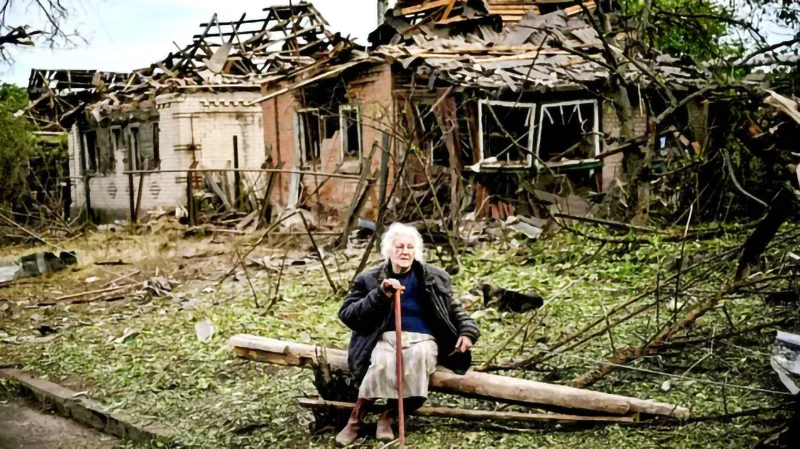
 The world has unhappily arrived at the 4th anniversary of the Russian invasion of Ukraine and as could be seen a resolution to the long-bleeding war is nowhere in sight. In fact the crisis has taken a turn for the worse with the Russian political leadership refusing to see the uselessness of its suicidal invasion and the principal power groupings of the West even more tenaciously standing opposed to the invasion.
The world has unhappily arrived at the 4th anniversary of the Russian invasion of Ukraine and as could be seen a resolution to the long-bleeding war is nowhere in sight. In fact the crisis has taken a turn for the worse with the Russian political leadership refusing to see the uselessness of its suicidal invasion and the principal power groupings of the West even more tenaciously standing opposed to the invasion.
One fatal consequence of the foregoing trends is relentlessly increasing ‘Global Disorder’ and the heightening possibility of a regional war of the kind that broke out in Europe in the late thirties at the height of Nazi dictator Adolph Hitler’s reckless territorial expansions. Needless to say, that regional war led to the Second World War. As a result, sections of world opinion could not be faulted for believing that another World War is very much at hand unless peace making comes to the fore.
Interestingly, the outbreak of the Second World War coincided with the collapsing of the League of Nations, which was seen as ineffective in the task of fostering and maintaining world law and order and peace. Needless to say, the ‘League’ was supplanted by the UN and the question on the lips of the informed is whether the fate of the ‘League’ would also befall the UN in view of its perceived inability to command any authority worldwide, particularly in the wake of the Ukraine blood-letting.
The latter poser ought to remind the world that its future is gravely at risk, provided there is a consensus among the powers that matter to end the Ukraine crisis by peaceful means. The question also ought to remind the world of the urgency of restoring to the UN system its authority and effectiveness. The spectre of another World War could not be completely warded off unless this challenge is faced and resolved by the world community consensually and peacefully.
It defies comprehension as to why the Russian political leadership insists on prolonging the invasion, particularly considering the prohibitive human costs it is incurring for Russia. There is no sign of Ukraine caving-in to Russian pressure on the battle field and allowing Russia to have its own way and one wonders whether Ukraine is going the way of Afghanistan for Russia. If so the invasion is an abject failure.
The Russian political leadership would do well to go for a negotiated settlement and thereby ensure peace for the Russian people, Ukraine and the rest of Europe. By drawing on the services of the UN for this purpose, Russian political leaders would be restoring to the UN its dignity and rightful position in the affairs of the world.
Russia, meanwhile, would also do well not to depend too much on the Trump administration to find a negotiated end to the crisis. This is in view of the proved unreliability of the Trump government and the noted tendency of President Trump to change his mind on questions of the first importance far too frequently. Against this backdrop the UN would prove the more reliable partner to work with.
While there is no sign of Russia backing down, there are clearly no indications that going forward Russia’s invasion would render its final aims easily attainable either. Both NATO and the EU, for example, are making it amply clear that they would be staunchly standing by Ukraine. That is, Ukraine would be consistently armed and provided for in every relevant respect by these Western formations. Given these organizations’ continuing power it is difficult to see Ukraine being abandoned in the foreseeable future.
Accordingly, the Ukraine war would continue to painfully grind on piling misery on the Ukraine and Russian people. There is clearly nothing in this war worth speaking of for the two peoples concerned and it will be an action of the profoundest humanity for the Russian political leadership to engage in peace talks with its adversaries.
It will be in order for all countries to back a peaceful solution to the Ukraine nightmare considering that a continued commitment to the UN Charter would be in their best interests. On the question of sovereignty alone Ukraine’s rights have been grossly violated by Russia and it is obligatory on the part of every state that cherishes its sovereignty to back Ukraine to the hilt.
Barring a few, most states of the West could be expected to be supportive of Ukraine but the global South presents some complexities which get in the way of it standing by the side of Ukraine without reservations. One factor is economic dependence on Russia and in these instances countries’ national interests could outweigh other considerations on the issue of deciding between Ukraine and Russia. Needless to say, there is no easy way out of such dilemmas.
However, democracies of the South would have no choice but to place principle above self interest and throw in their lot with Ukraine if they are not to escape the charge of duplicity, double talk and double think. The rest of the South, and we have numerous political identities among them, would do well to come together, consult closely and consider as to how they could collectively work towards a peaceful and fair solution in Ukraine.
More broadly, crises such as that in Ukraine, need to be seen by the international community as a challenge to its humanity, since the essential identity of the human being as a peacemaker is being put to the test in these prolonged and dehumanizing wars. Accordingly, what is at stake basically is humankind’s fundamental identity or the continuation of civilization. Put simply, the choice is between humanity and barbarity.
The ‘Swing States’ of the South, such as India, Indonesia, South Africa and to a lesser extent Brazil, are obliged to put their ‘ best foot forward’ in these undertakings of a potentially historic nature. While the humanistic character of their mission needs to be highlighted most, the economic and material costs of these wasting wars, which are felt far and wide, need to be constantly focused on as well.
It is a time to protect humanity and the essential principles of democracy. It is when confronted by the magnitude and scale of these tasks that the vital importance of the UN could come to be appreciated by human kind. This is primarily on account of the multi-dimensional operations of the UN. The latter would prove an ideal companion of the South if and when it plays the role of a true peace maker.
Features
JVP: From “Hammer and Sickle” to Social Democracy – Or not?
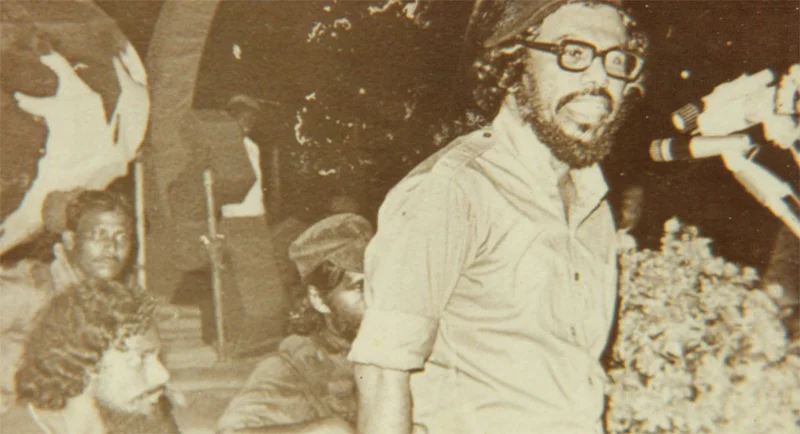
The National People’s Power (NPP), led by the Janatha Vimukthi Peramuna (JVP), came to power promising democratic renewal and long-awaited economic, educational, healthcare, and social transformation. It pledged to build a modern Sri Lanka rooted in democratic values while steering the country toward its vision of Democratic Socialism. For many supporters, the NPP’s rise to the pinnacle of political power represents a historic opportunity to reset the nation’s direction.
Yet recent developments have stirred unease. Statements by several senior ministers and certain policy signals have prompted critics to question whether the government’s path remains firmly democratic. Some warn that in the pursuit of rapid development and social justice, central pillars of the NPP’s election campaign, there may be a growing temptation to consolidate power in ways that edge toward policies of old “Hammer & Sickle.”
Is the NPP committed to pluralistic democratic socialism, or is Sri Lanka witnessing the early signs of a more centralised political model? To answer this question, it is necessary to revisit the JVP’s ideological history, examine the pressures that shape governing parties once in power, and weigh the potential consequences, both promising and perilous, of any shift in direction.
History of the JVP
The JVP emerged in the mid-1960s with a revolutionary agenda, mobilising youth through its Five Lecture Programme, which criticised capitalist policies, questioned the country’s “real independence,” opposed Indian influence, and called for armed struggle. This ideology culminated in the 1971-armed uprising against the elected government, leading to widespread violence, a harsh state crackdown, mass arrests, and the banning of the party.
Although suppressed, the JVP later re-entered democratic politics after its leaders were imprisoned and eventually pardoned. In the 1980s, after electoral defeat, the JVP shifted from strict Marxist-Leninist ideology toward a national, framework known as “Jathika Chinthanaya”, while maintaining strong opposition to Indian involvement.
However, it launched a second violent insurgency in 1988–1989, resulting in significant loss of life and severe repression, including the killing of its leader, Rohana Wijeweera. These events marked a decisive turning point, after which the party gradually moved away from armed struggle and embraced parliamentary politics.
By 1994, the JVP abandoned armed insurrection and embraced parliamentary democracy. While retaining its Marxist-Leninist identity, it adopted a more pragmatic socialist approach, seeking influence through elections rather than violence.
Embracing Parliamentary Democracy
The party served as Ministers and Deputy Ministers under President Chandrika Kumaratunga (2004–2005) and later supported Mahinda Rajapaksa in the 2005 presidential and subsequent parliamentary elections. Between 2005 and 2010, the JVP aligned with the Rajapaksa government in opposing federalism and supporting a unitary state.
Historically, the JVP opposed federalism. Under Anura Kumara Dissanayake (AKD), however, there appears to be a strategic shift toward decentralisation and inclusivity, without formally endorsing federalism. Since 2019, the NPP/JVP has criticised successive governments for failing to implement the 13th Amendment fully. This transformation is real and should be acknowledged.
Reports indicate the NPP/JVP is drafting a new constitution, but there is limited public clarity on its position regarding abolishing the Executive Presidency and devolving powers to Provincial Councils. Sri Lanka can chart a path toward a united, prosperous future where all citizens feel valued and represented. Therefore, I hope that NPP will consider the Provincial Councils in their current form might best serve as a relic of the past, making way for more cohesive and efficient systems of governance.
It is also a fact that many parties have historically criticised the Executive Presidency while in opposition, only to retain it in power. Whether the NPP/JVP will pursue genuine reform remains a subject of debate.
Democratic Concerns State Power
A recent statement by a senior Cabinet Minister that the party holds government power but has not yet “captured” broader state power raises fundamental questions. In a parliamentary democracy, winning government is the highest legitimate authority a party can obtain. Government power is temporary which is granted by voters, limited by the Constitution, and revocable at elections.
State power is permanent and it lies with state institutions i. e. the judiciary, administrative service, armed forces, law enforcement, and independent commissions. These bodies must remain politically neutral and serve the Constitution, to prevent any ruling party from dominating the permanent machinery of governance.
To frame democratic victory as incomplete without “capturing” state power, suggests a conception of power that goes beyond electoral legitimacy. It echoes a revolutionary mindset highlighting the real transformation requires ideological alignment of the state itself.
Past few decades, Sri Lanka has suffered from politicised institutions. Replacing one form of control with another is not reform, it is substitution.
Judiciary and Due Process
Public frustration over past corruption is understandable. However, allegations must be addressed through due legal process. In a democracy, individuals are innocent until proven guilty in a court of law. When parliamentarians publicly pass judgments on opposition figures before judicial proceedings conclude, it risks undermining the rule of law and raising concerns about political overreach.
Concerns are further heightened when there are perceptions that the rule of law is not applied equally, particularly if members of the governing party are treated differently in similar circumstances in the recent past. Unequal enforcement of legal standards can erode public trust in institutions. If such patterns persist, they may raise broader questions about the strength and impartiality of democratic governance.
Village-Level Courts
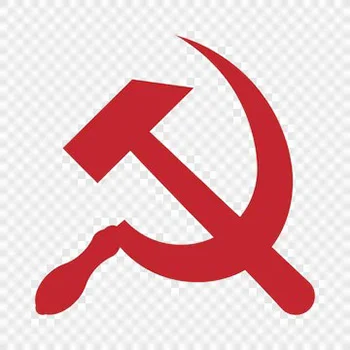
Democratic Concerns
State Power
In another recent statement, by a senior Minister reiterated one of his earlier proposals to establish judicial courts at the village level to adjudicate certain legal cases, depending on the nature and severity of the alleged offences. While improving local access to justice may enhance efficiency, such courts require strong institutional safeguards.
As this proposal raises serious concerns, it bears characteristics often associated with totalitarian systems, where village-level courts may be controlled by ruling party “cadres” who preside over legal matters and pass judgments against individuals. Without strong safeguards to ensure independence, transparency, and adherence to the rule of law, such courts could be misused to suppress dissent and curtail legitimate political opposition.
Any reform of the judicial system must uphold constitutional protections and preserve the separation of powers. Failing to do so could raise broader concerns about democratic accountability and institutional independence.
Civil / Administrative Service
Before 1978, Sri Lanka’s civil service was widely respected for its professionalism and independence. Over time, however, political appointments increasingly influenced senior administrative positions.
There are growing concerns that some recent appointments to high-level administrative service posts by the NPP may also be politically motivated. Many voters expected systemic reform and a decisive shift toward merit-based governance under the NPP/JVP. It is disappointing to observe indications that similar patterns of politicisation may be continuing.
The real test of reform lies not in rhetoric but in institutional safeguards. Transparent selection criteria, independent oversight mechanisms, and clear accountability structures are essential to ensuring that the administrative service remains professional and non-partisan.
History shows that democracy does not usually collapse overnight. It erodes gradually when ruling parties seek to align permanent institutions with their own ideological or political objectives.
Strengthening institutional independence is not optional, it is imperative. Sri Lanka’s democratic future depends not only on who holds power, but on how responsibly that power is exercised.
Media Freedom
“I disapprove of what you say, but I will defend to the death your right to say it”
(Evelyn Beatrice Hall, describing Voltaire’s belief in freedom of speech.)
Recent reports suggest the NPP/JVP government is dissatisfied with parts of the media, accusing some outlets of political bias and even proposing bans for allegedly spreading false information. Such actions would be undemocratic and would weaken constructive criticism.
Governments already possess legal remedies for defamation. If laws are inadequate, they may be reviewed. However, this must not undermine the media’s fundamental right to fair, independent, and legitimate criticism of those in power.
Every government dislikes criticism. But mature democracies tolerate it. Any attempt to restrict the media risks eroding democratic freedoms and should be adamantly opposed by all who value an independent media.
Religion and Public Conduct
In the past, opposition parties accused the JVP of being hostile to religion, particularly toward Buddhist monks aligned with political opponents. Confirming this accusation, recently a few NPP/JVP ministers, MPs, and party supporters have publicly criticised Buddhist monks who speak and organise meetings against the government.
At the same time, social media contains intolerable language about the conduct of certain Buddhist monks. While misconduct by members of the clergy is concerning, it does not justify hostile or disrespectful reactions from politicians or the public.
Responding with anger and division contradicts the very Dhamma many claim to defend. Using monks as political tools, or attacking them publicly, only deepens social divisions. If there are genuine concerns about the monastic order, they should be addressed respectfully through proper religious channels rather than through public humiliation.
Economic Democracy
Following Sri Lanka’s 2022 fiscal crisis, the NPP/JVP revised its economic policy and aligned itself with a framework closer to Social Democracy. This shift suggests that the JVP has accepted capitalism as the economic system necessary to revive the collapsed economy. At the same time, it has emphasised redistribution, welfare measures, and regulatory reforms aimed at reducing inequality.
The NPP/JVP’s economic policy now focuses on reforming capitalism rather than replacing it. The party initially sought to renegotiate the IMF agreement to ease the burden on the public. However, it was unable to secure significant changes. A key long-term objective remains reducing dependency on imports. The NPP aims to promote local industries and agriculture, while supporting small and medium-sized enterprises (SMEs) to reduce unemployment and expand export capacity.
Although the party pledged to strengthen state-owned enterprises through improved management rather than outright privatisation, recent developments indicate a shift toward public-private partnerships and selective privatisation.
Overall, economic progress is gradually aligning with these reformed Capitalist policies. This approach marks a significant departure from the original “Hammer and Sickle” ideology associated with classical Marxist theory as articulated by thinkers such as Karl Marx, Vladimir Lenin, and Friedrich Engels.
If judged solely on economic direction, the shift from revolutionary rhetoric to reformist governance appears substantial.
Bribery and Corruption
The nation is deeply grateful to the NPP government for taking bold steps to minimise bribery and corruption, which have long been a cancer eating away at our society. For decades, this practice has existed from top politicians to the lowest levels of the state sector, and even within society at large. Full credit must be given to the NPP government for prioritising the fight against this unethical and deeply rooted problem. It is hoped that the law will be applied equally to everyone, irrespective of status or party affiliation.
However, the public remains sceptical about the delay in pressing charges against the alleged culprits. During the election campaign, the JVP claimed that it possessed substantial evidence, over one hundred files, sufficient to prosecute members of previous governments accused of misusing public funds. Are they now discovering that the evidence is not as concrete as initially suggested?
Conclusion
Having analysed the current situation of the NPP/JVP, it is evident that there are conflicting statements from some senior figures in the JVP. Some favour the continuation of the traditional “Hammer and Sickle” policies. Others within the NPP emphasise and implement aspects of Social Democratic policies. Considering these differences, the nation is entitled to seek clarity regarding the government’s present direction.
It remains to be seen whether the JVP is merely marking time before reintroducing its former ideological policies, or whether it has genuinely chosen the path of Social Democracy.
By Gamini Jayaweera
Features
Valentine’s Day fundraiser … a huge success

In Melbourne, Australia, catering veteran Chris Cannon hosted the annual Valentine’s Day fundraiser at the Springvale RSL, with all proceeds being donated to the Home of Compassion in Sri Lanka, run by the Mother Teresa Sisters.
The Valentine’s Day fundraiser was held on 14 February and the event featured music by Shey and George (of Redemption fame) and DJ Jeremy Ekanayake.
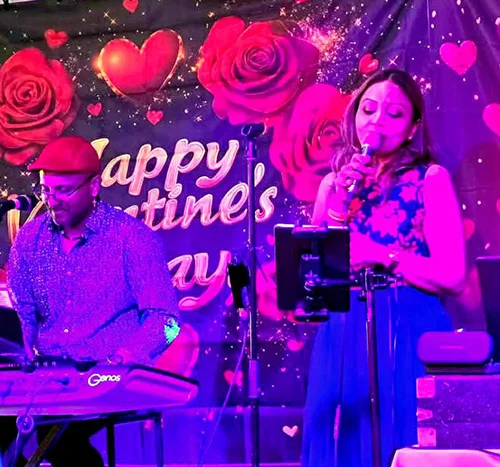
Shey and George providing the entertainment
The international buffet was a spread of Thai specialties and yummy Sri Lankan dishes and the large crowd present enjoyed the setup thoroughly, I’m told.

The lucky winner … trip to Sri Lanka
The Thai Street Food buffet was provided by Chris Cannon’s catering service, with his Thai wife, Annie, doing the needful.

The Cannon Team: Alice, Annie and Chris
His daughter, Alice, also played an active part in this fundraiser.
Chris, a Sri Lankan-born Melbourne resident, who has been hosting this annual event for several years, with all proceeds going to charity, attributes the success of this Valentine’s Day fundraiser to the team that worked tirelessly to make it a happening event.

Rose and a teddy for the ladies
“I’m ever so grateful to the Team that was responsible for the success of this fundraiser. They all worked with enthusiasm and the smiles on their faces, at the end of the event, said it all.”
It was a sell-out, with every lady receiving a rose and a teddy but, unfortunately, said Chris “we had to disappoint several who wanted tickets as it was a limited space venue.”
What’s more, there were also attractive prizes on offer, including a seven nights stay in Sri Lanka.
-

 Features5 days ago
Features5 days agoWhy does the state threaten Its people with yet another anti-terror law?
-

 Features5 days ago
Features5 days agoReconciliation, Mood of the Nation and the NPP Government
-

 Features5 days ago
Features5 days agoVictor Melder turns 90: Railwayman and bibliophile extraordinary
-

 Features4 days ago
Features4 days agoLOVEABLE BUT LETHAL: When four-legged stars remind us of a silent killer
-

 Features5 days ago
Features5 days agoVictor, the Friend of the Foreign Press
-

 Latest News6 days ago
Latest News6 days agoNew Zealand meet familiar opponents Pakistan at spin-friendly Premadasa
-

 Latest News6 days ago
Latest News6 days agoTariffs ruling is major blow to Trump’s second-term agenda
-

 Latest News6 days ago
Latest News6 days agoECB push back at Pakistan ‘shadow-ban’ reports ahead of Hundred auction













